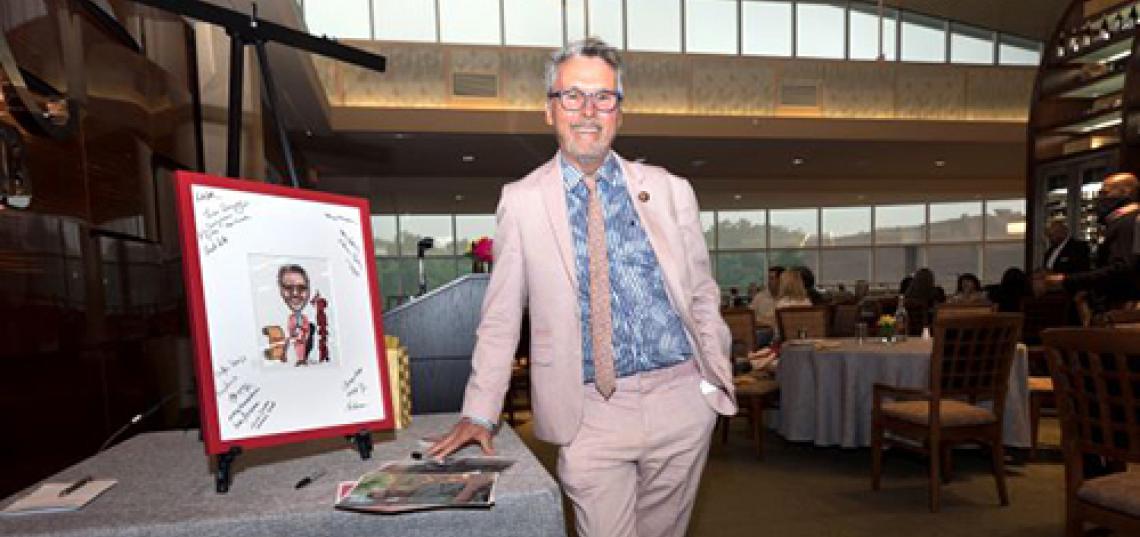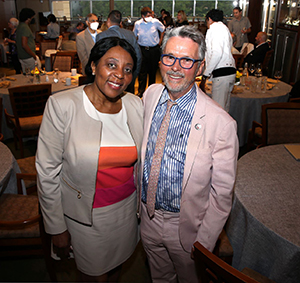
After seven years of successfully leading the the School of Communication and Information, Dean Jonathan Potter will step down as dean on June 30, 2022, and transition to a faculty position within the school.
Looking back on August 17, 2015, the day he arrived on the banks to begin his tenure, Dean Potter said his vision as dean then was to work “for the long-term success of the entire school. That involved juggling a focus on sustaining an environment in which brilliant scholarship can flourish, recruiting the brightest, and enhancing the infrastructure that supports grant identification and capture, publication success, and scholarly communication through conferences and journals.”
He added, “this involved drawing on an understanding of the complex university dynamics that the school works within. It also involved supporting a high-quality, engaging, and rewarding student experience that sets our students up for the workplace with knowledge and skills suitable for a very fast-changing world of work. There is no algorithm for doing this. It involves judgment, and it involves compromise. And inevitably some things will be more successful than others.”
 During his leadership, Dean Potter has seen his vision largely come to fruition, while he also faced and overcame unforeseen challenges. The greatest of these was successfully leading the school through the COVID-19 pandemic.
During his leadership, Dean Potter has seen his vision largely come to fruition, while he also faced and overcame unforeseen challenges. The greatest of these was successfully leading the school through the COVID-19 pandemic.
Below, SC&I speaks with Dean Potter about his leadership, legacy, the lessons he learned during the pandemic, and his bright future as he prepares for his next position as a distinguished professor, where he will continue to teach and work on a book (with SC&I Research Professor of Communication Alexa Hepburn) that aims to critically synthesize research over the last 20 years on emotion in interaction.
SC&I: You successfully led SC&I through the COVID-19 pandemic. What are some of the lessons you learned, both transient and lasting?
JP: I was very struck by how when the COVID emergency arrived how quickly faculty and staff were able to mobilize to analyse the evolving situation and put in place new procedures. There is no doubt that our existing expertise in online teaching, our instructional design capacity, and our familiarity with virtual learning environments such as Canvas helped us enormously. The so-called pivot to online was undoubtedly challenging for all involved yet SC&I performed admirably.
The more lasting lessons are still to be fully understood, but it is unlikely that we will return to the same proportion of face-to-face teaching we had before. The flexibility offered by online and hybrid teaching has proved popular and effective.
Likewise the ability of remote work to cut down on commuting and adjust work life balance has opened up a future that may be very different from the past.
SC&I: How did your leadership impact the cutting-edge research and teaching at SC&I?
JP: When I arrived, I was strongly attracted to SC&I ‘s disciplinary mix. Having run a school in England with some odd bedfellows (sedimentology and modern history anyone) I saw SC&I as having a perfect mix of disciplines. It covered a social science space, but not one broken into traditional units like sociology and psychology. It covered the burgeoning fields of data science, computational social science, etc, but in a social science context. It had organizations as a topic, but not broken off into a management school. And it had a strong, but plural, social justice theme running through it. I didn’t have to invent that (not that I could have!), rather it was there to be disrupted, or built on. I chose building.
I see leadership as fundamentally collective, as a function of a great team working together. Thus the accomplishments are shared; to site them in one individual is a mistake.
I am not sure how original it is, but I wanted to keep the advantages of the strong HR organization of departments (mentoring, A&P), and the fluidity of school wide research, supported by the way our research entities mostly cut across boundaries. That is often glossed as interdisciplinarity; however, SC&I innovation joins strong disciplinary ties with new topics and post-disciplinary reordering, new methods are applied to old and new problems, and so on. And it provides an environment for supporting collaborative research teams which have the range and capacity for tackling major contemporary challenges.
SC&I: Please describe your thoughts on leadership and how your views impacted your decision to build a new leadership structure within the Dean’s Office.
JP: Let me preface this with something I think fundamental about good leadership. It is not an individual role where you have your own accomplishments. There are two key reasons for this.
First, in universities doing anything requires community assent (put another way, if you do not have that assent what you do is likely to fail). This means that a major prerequisite for everything else is bringing the community along. And that involves consultation, communication, offering a vision and where necessary persuasion. I worked hard at that, although it did not feel like hard work as it is very rewarding in itself.
Second, I see leadership as fundamentally collective, as a function of a great team working together. Thus the accomplishments are shared; to site them in one individual is a mistake.
 Nevertheless, this does require the right structure to work effectively. My view was that you consider the central functions in an academic school and give each a key leader, mostly an associate dean. Thus we teach, so you need an associate dean for programs (and all the related aspects that go along with teaching, maybe in the new parlance, an associate dean for oversight of the student experience). We also research, so you need an associate dean for research (and all the strategy that helps guide that and the infrastructure that supports it). We also operate as a complex organization that has to manage space, communication, finance, student services, record keeping, and so on. So you need an associate dean for administration. Those three roles have oversight of their areas, and they also represent these constituencies at the center. School decision making benefits from these three areas of knowledge and expertise and the role of the dean is often to decide on the basis of such discussions.
Nevertheless, this does require the right structure to work effectively. My view was that you consider the central functions in an academic school and give each a key leader, mostly an associate dean. Thus we teach, so you need an associate dean for programs (and all the related aspects that go along with teaching, maybe in the new parlance, an associate dean for oversight of the student experience). We also research, so you need an associate dean for research (and all the strategy that helps guide that and the infrastructure that supports it). We also operate as a complex organization that has to manage space, communication, finance, student services, record keeping, and so on. So you need an associate dean for administration. Those three roles have oversight of their areas, and they also represent these constituencies at the center. School decision making benefits from these three areas of knowledge and expertise and the role of the dean is often to decide on the basis of such discussions.
So perhaps my most significant and early accomplishment was the identification of these three roles. Key to success is not just the roles but great people in those roles. I inherited a most wonderful associate dean for administration in Karen Novick. She has been a backbone of everything accomplished since I have been here. Phil Napoli was a great associate dean for research – I could quite understand why Duke University wanted to steal him. Luckily, we had someone with the complex vision for the research space available in Mark Aakhus who has built SC&I’s current research infrastructure, and helped visualize some of our broader strategic directions, as well as articulating those directions at a broader university level. Equally luckily, we had the chance to bring in someone with a huge wealth of leadership experience in the form of Dafna Lemish as associate dean for programs.
SC&I: Many new faculty members were appointed during your years as dean. How do you anticipate that they will they contribute to SC&I, Rutgers, and the world?
JP: The brilliant faculty appointed in the last seven years will have a huge impact on SC&I, their research areas, and the world. One of the great things about new faculty is that you cannot predict what they will do. They have new ideas, different skills and training, and they can disrupt in new ways. Also, as a cohort they stimulate and support each other. There is a real sense that the future of SC&I is in their hands; they will help take us to new heights.
SC&I: How did you succeed in positioning SC&I within Rutgers University?
JP: Throughout my time here I have used every opportunity to highlight SC&I’s position within Rutgers as delivering excellent and innovative teaching and producing world quality research. I have worked against the idea that our work can tell you how to write and deliver a good speech, plan a poster campaign, and communicate clearly. We do know about these things, and quite appropriately we teach them to a lot of students, but our center of gravity is in cutting edge areas of data, platforms, organizations, systems, interaction, analytics and their connections to communities, inequality and diversity.
During my time at SC&I I have given the highest priority to establishing and sustaining a warm and collegial community. Such an environment is the foundation for everything else.
SC&I: You have written that working in a collegial and supportive environment is “the foundation for everything else.” How have you succeeded in fostering such an environment at SC&I and what are the keys to maintaining it?
JP: During my time at SC&I I have given the highest priority to establishing and sustaining a warm and collegial community. Such an environment is the foundation for everything else. I believe we have done very well. But we mustn't take it for granted in the future. We all have a responsibility to care for one another—staff, faculty, and students—and give each other support and respect.
SC&I: You have mentioned that while you were born in a small village on the south coast of England, you have grown quite fond of New Jersey. What are some of the state’s qualities you enjoy the most and plan to take advantage of in the future?
JP: After a slow start, Alexa and I have grown to love the shore at Asbury Park. The beach is a festival of cultures and entertainment; and then there is Mogo Taco and Talullas vegan pizza. Hidden Grounds/Simply Chai are my favorite coffee places in North America, and always a perfect start to the day along with a good source of local intel. And the Rutgers Ecological Preserve is a wonderful piece of wilderness on our doorstep.
Discover more about the Rutgers School of Communication and Information on the website.
Photos: Courtesy of Jonathan Potter
